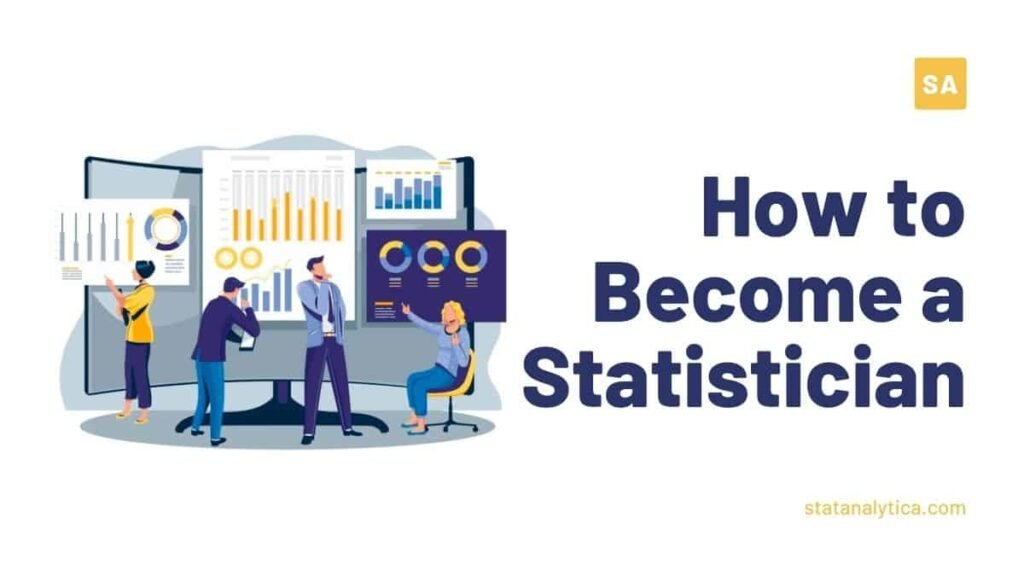Today I am going to share with you the top tips to become a statistician. Before we get started we need to know what is statistician, what they do and what skills are required to be a successful statistician. We will also take a look at which degrees can lead to a successful career as a statistician, amongst both traditional on-campus ones, as well as accelerated online degrees. Let’s dig into it.
What is a Statistician?
Table of Contents
Statisticians use the concepts of applicable data to analyze large sets of data, interpret this data, and interpret it. Statisticians collect data through methods such as elections and experiments and present conclusions to other members of their organizations.
There are many employment opportunities for statisticians, such as research, education, government, healthcare, and manufacturing.
What does a Statistician do?
Statisticians work with end-to-end data. First, a statistician should collect the necessary and relevant data for his research. Often, statisticians should design surveys, questionnaires, and experiments that lead to this data collection, including decisions about sample size and voting method.
The statistician then analyzes this data by using technical software, and identifies trends and patterns, while also ensuring that the data is reliable. Finally, a statistician creates ways to visualize this data, such as graphs, charts, reports, and so on, and presents this information to others.
Statisticians may need to accept errors in any sample and suggest further lines of inquiry or provide ways that data supports certain recommendations to improve certain aspects of business for an organization.
Statistician job description
- Determine to resolve the problem, and what data is required to resolve it
- Choose the appropriate ways to get data, sometimes designing new data collection tools
- Proceed the process of collecting data, or train others to do so
- Prepare data for analysis, including monitoring data quality and finding ways to improve data collection or analysis for future projects.
- Explain complex data sets by using analytical tools including software, algorithms, and models
- Identify trends in data through a combination of technical skills and professional understanding
- Findings of reports through data visualization to shareholders, often including non-technical audiences.
Skills are required to become statisticians
To be successful, statisticians need a variety of skills. These skills include technical skills, professional skills, and interpersonal strength. However, statisticians should have problem-solving and critical-thinking skills to make the best use of all these other essential capabilities.
Technical skills include
- Specializing in applied and theoretical statistics, including hypothesis testing and summary statistics
- Including mathematics, calculus, linear algebra, and probability
- Data mining, cleaning, and visualization, including expertise in technical programs for each of these
- Efficiency in languages, especially R and SAS, as well as programming languages like Python, C/C++, and Other Languages.
- Hadoop-based analytics, such as Hive and Pig, for big data
- Databases like NoSQL and cloud computing
- Machine Learning
Statisticians should have strong communication skills to present the findings of various shareholders, including colleagues and external clients, who may not have a technical background.
Statisticians should be able to logically assess the strengths and weaknesses of their data and methods, which require purposeful skills. Finally, statisticians should understand the industry in which they are analyzing data to understand trends both in their company and in the field at large.
Tip on how to become a statistician?
Get your undergraduate degree
A bachelor’s degree in an applied subject is necessary to become a statistician. The most relevant degree is in the data, of course; Beyond your research in statistics, you want to take courses in calculus, linear algebra and computational thinking.
Many other degrees can also lead to a good foundation in statistics, including mathematics (especially applied mathematics), computer science and economics. Many scientific degrees often include statistics that you want to pursue if you know that you want to use your training in a specific field, such as biostatistics.
Get experience through internships and data analysis competitions
There are many ways to prepare for your career as a statistician while in college. The experience is necessary to get a job as a statistician, so start looking for an internship that provides both real-world training and college credits while working on your bachelor’s degree.
You can also find data analysis competitions that give you the opportunity to test your skills with real-world data, such as Kagal, DrivenData, and KDnuggets. These competitions offer challenges that are not as structured and clean as the problems you face in a particular undergraduate course.
Get an advanced degree
Most professional statisticians have a master’s degree in applied data or mathematics, and many also complete their doctoral degrees. A doctoral degree is necessary for individuals who want to teach in a university, while a master’s degree may be sufficient for employment in the private and government sectors.
Add professional certifications to your resume.
Many different certification tests and portfolio reviews offer ways to prove your skills. The American Statistical Association provides the title of a professional statistician recognized through a professional portfolio review. There are two levels of certification: entry-level GStat – for those who have completed their bachelor’s degree – and PStat, who also need letters of recommendation and work samples.
For statisticians who want to show their proficiency in SAS, the SAS certified statistical company analyst is a good choice. You can also consult requirements for job listings that interest you to determine which certificates will be most effective and ultimately valuable by potential employers.
Practice in a field
Professional statisticians can find work in many fields, but to actually stand out for an employer, you want to show how your education and experience perfectly suit you for the job. Statisticians work in finance, education, psychology, biology, geography, economics, health, marketing, and product development and government at all levels. Government positions are likely to grow for statisticians, as pharmaceutical companies are working.
Gain Work Experience
Work experiences vary according to the level of education in statistics. Many graduates of undergraduate and master’s degree programs often work for the federal government as statisticians.
The Department of Health and Human Services, Agriculture and Commerce employ the majority of statisticians. If a student has completed an internship or has work experience, he may have a better chance of getting employment. Students gain experience by working as a Ph.D. Teaching Assistant.
Conclusion
If you will follow all these tips mentioned above on how to become a statistician, then no one will ever restrict you to be a successful statistician. You can also get the best statistics assignment help as well as statistics homework help to boost your efforts in the way to becoming a successful statistician. You can also get the assignment math from our experts at very reasonable prices.


